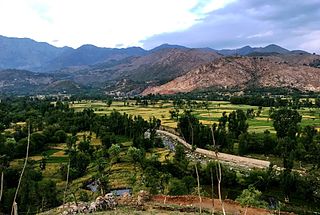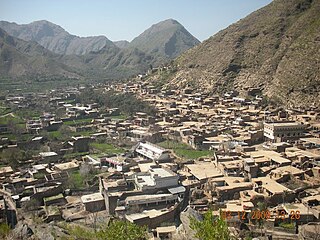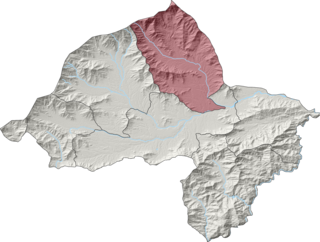Related Research Articles
Waziristan is a mountainous region of Pakistani province of Khyber Pakhtunkhwa. The Waziristan region administratively splits among three districts: North Waziristan, Lower South Waziristan District, and Upper South Waziristan District. Waziristan region, consisted of three districts, covers around 11,585 square kilometres (4,500 sq mi) and is mainly populated by the Mehsud, The Wolves, & Wazir Pashtun tribe, who speak the Waziri dialect of the Pashto language.
Tonk is a town in Tonk district of the Indian state of Rajasthan. The town of Tonk is situated 95 km (60 mi) by road south from Jaipur, near the right bank of the Banas River. It is the administrative headquarters of Tonk District. Tonk was also the capital of the eponymous princely state of British India from 1817 to 1947. Kamal Amrohi's movie Razia Sultan were shot in Tonk in 1981–82. Famous places in Tonk include: Shahi Jama Masjid, Bisalpur Dam, Arabic Persian Research Institute, Sunhari Kothi, Hathi Bhata, Annapurna Dungri Ganesh Temple, Rasiya Ki Tekri, Kidwai Park, Ghantaghar, Kamdhenu Circle, Nehru Garden, Chaturbhuj Talab Lake. It is also known as Rajasthan's Nawabo ka shahar.

North Waziristan District is a district of Khyber Pakhtunkhwa province in Pakistan. It is the northern part of Waziristan, a mountainous region of northwest Pakistan, bordering Afghanistan and covering 4,707 square kilometres (1,817 sq mi). The capital city of North Waziristan is Miranshah.

Nawab Muhammad Amir Khan (1769–1834) was a military general in the service of Yashwantrao Holkar of the Maratha Empire and later became the first ruler of the princely state of Tonk. Amir Khan was a Hindustani Pathan and a North Indian Muslim. Born and bred in Sambhal, Amir Khan was the son of a Zamindar in Uttar Pradesh, Hayat Khan, while his grandfather Taleh Khan was a Pashtun from the Salarzai tribe of District Buner in modern-day Pakistan who had migrated to and acquired land in Rohilkhand.

Bajaur District, formerly Bajaur Agency, is a district in the Malakand Division of Khyber Pakhtunkhwa Province, Pakistan. Prior to 2018, Bajaur Agency was the northernmost component of the Federally Administered Tribal Areas (FATA), a semi-autonomous region along the Afghanistan–Pakistan border. In May 2018, FATA was merged into the larger Khyber Pakhtunkhwa Province (KPK) in an attempt to bring stability to the region, redesignating Bajaur Agency to Bajaur District.

Tonk was a princely state in India under the supervision of the Rajputana Agency of the British Raj. It was located primarily in the present-day Indian state of Rajasthan with small portions in Madhya Pradesh. The town of Tonk, which was the capital of the state, had a population of 273,201 in 1901. As a salute state, its ruler, styled the Nawab of Tonk, was granted a 17-gun salute. The state came to an end after the partition of India when the Nawab of Tonk acceded to India. At that time, it was the only princely state of Rajputana with a Muslim ruling dynasty.

In India, there are autonomously administered territories for Scheduled Tribes, administered by representatives of those tribes. The Sixth Schedule of the Constitution of India allows for the formation of Autonomous District Councils and Autonomous Regional Councils in Assam, Meghalaya, Mizoram, and Tripura, granting them autonomy within their respective territories. Currently, there are 10 Autonomous District Councils across these four states. In these areas, Acts of Parliament and state legislation do not apply.

The Bettani, also spelled Batani, Baittani or Bhittani, is a Pashtun confederacy located mostly in Afghanistan and Pakistan. The Bettani are named after Shaykh Beṭ, their legendary ancestor, who is said to be the third and last son of Qais Abdur Rashid.

The Mullagori or Mulagori or Malagori is a Pashtun tribe present in Khyber District, tribal areas in Khyber Pakhtunkhwa, Pakistan. Historically, they are one of the smallest tribes of ethnic Pashtuns. They are considered as a sub-tribe of Momand Pashtun Ghoryakhel confederacy.

Sirkanay District is situated in the central part of Kunar Province, Afghanistan. It borders Pakistan to the south. The population is 39,292 (2019). The district administrative center is the village of Serkanay at 775 m altitude. To the north the district borders the Kunar River, which irrigates the small part of arable land. Drought is the major problem of the people. The majority of the houses (70%) were destroyed during the wars. Many young men live and work in Pakistan.

The Battle of Bajaur, also known as Operation Sherdil, was a military campaign in the Bajaur region of Pakistan. It was conducted on 7 August 2008 by the Frontier Corps and Infantry Brigade of Pakistan army. The operation was primarily launched to end the political movement of the Tehrik-e-Taliban Pakistan. Bajaur area was administered by Tehrik-e-Taliban Pakistan until 2007, and it remained Al-Qaeda's central command and control for carrying out activities in Northeast Afghanistan and Kunar province. Recent reports indicate that ongoing conflict has newly displaced an estimate of 7,000 people between 3 and 4 March in Nurgal district.
Karindara is a small village in the Martung tehsil of Shangla District, Khyber Pakhtunkhwa, Pakistan. Karindara's history dates back to 1905 when Salarzai tribes migrated from Jawor district, Buner. It has a population of over 7,000. Situated approximately 5 km from Martung Bazar, 110 km from Mingora, 65 km from Alpurai, and 375 km from Islamabad, its strategic location enhances its connectivity.
On 25 December 2010, at least 47 people were killed and over 100 others injured, after a female suicide bomber detonated her explosives in a large crowd of people displaced by fighting, who were collecting food at a distribution centre of the World Food Programme in the Pakistani town of Khar, which is located within the Bajaur tribal region, of north-western Pakistan. It was later reported by witnesses, that the bomber dressed in a full-length burka had reportedly thrown a grenade after resisting search, to which then the bomber proceeded to detonate her explosives. Several police officials confirmed the bomber was a woman, as opposed to the more likely occurrence of a man wearing the burka as a disguise, in order to successfully conduct this suicide attack. It was also known that those in this crowd were predominantly displaced members of the Salarzai Tribe, which has supported Pakistan Army operations against the Pakistani Taliban within the Bajaur tribal regions. Those dozens of people injured in this suicide attack were apparently later taken to local hospitals via means of helicopters. Local Witnesses, including that of a government official at the main government hospital within the region, Dosti Rehman, claimed that he had personally counted some 40 bodies. However, there are concerns that the death toll could very likely rise, as the official stated that several of those injured, as a result of this suicide attack were apparently in a critical condition at the local hospitals. This particular bombing acts as one of a string of recent suicide attacks, which have occurred with near impunity, predominantly throughout Pakistan's north-western, Khyber Pakhtunkhwa Province, of north-western Pakistan. No particular militant group has of yet claimed responsibility for this suicide attack, although the Pakistani Taliban are strong suspects. The Bajaur tribal region has reportedly seen several Pakistan Army military operations in recent years, however such suicide attacks still continue throughout the region with near impunity. The Pakistani Prime Minister, Yousaf Raza Gillani later condemned this suicide attack, and claimed that such military offensives would continue against the Pakistani Taliban. This statement will be met with a certain degree of approval in the U.S., as Pakistan has recently been pressured to launch a major ground-offensive in the nearby North Waziristan tribal region, in order to root-out and destroy the last major remaining safe-haven for Radical Islamist and Pakistani Taliban insurgents within the country. The UN World Food Programme later suspended its food distribution activities in the Bajaur tribal region, as a security precaution to this suicide attack. This suicide bombing was strongly condemned by U.S. president, Barack Obama. The Pakistani Taliban later claimed responsibility for this suicide attack. This suicide bombing was officially declared the first such suicide attack to involve a female in Pakistan.
Ranglong is an ethnic people belonging to the Kuki people. The majority of the Ranglong people live in a small and densely-packed area in the northeastern part of India, mainly in the border areas of Tripura, Assam and Mizoram.

Kingergali is a village in Salarzai, Buner District, Khyber Pakhtunkhwa province, Pakistan. It was part of Yousafzai State of Swat. It was a major center of Buddhist art and culture in ancient times. The area flourished during the Kushan Empire and was adorned with Buddhist monasteries, stupas, and sculptures.
Gadezai is an administrative subdivision (tehsil) and Union council of Buner District in the Khyber Pakhtunkhwa province of Pakistan.
Formulli is a village in the Chach Valley of Attock District, within the Punjab province of Pakistan. It is situated near the Indus River, close to the border of the Khyber Pakhtunkhwa province.

Salarzai Tehsil is an administrative subdivision (tehsil) of Bajaur District in Khyber Pakhtunkhwa Province, Pakistan. Salarzai is the third largest of Bajaur District's seven tehsils.

Mamund Tehsil is an administrative subdivision (tehsil) of Bajaur District in Khyber Pakhtunkhwa Province, Pakistan. Mamund is the largest of Bajaur District's seven tehsils.
References
- 1 2 Addiction, Crime and Insurgency: The Transnational Threat of Afghan Opium. United Nations Publications. 2014. p. 127. ISBN 978-9-21054-308-8.